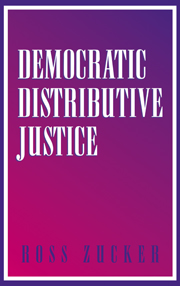Book contents
- Frontmatter
- Contents
- Acknowledgments
- 1 Democracy and Economic Justice
- Part I Unequal Property and Individualism in Liberal Theory
- 2 The Underlying Logic of Liberal Property Theory
- 3 Unequal Property and Its Premise in Locke's Theory
- 4 Unequal Property and Individualism, Kant to Rawls
- Part II Egalitarian Property and Justice as Dueness
- Part III Egalitarian Property and the Ethics of Economic Community
- Part IV Democracy and Economic Justice
- Conclusions
- References
- Index
2 - The Underlying Logic of Liberal Property Theory
Published online by Cambridge University Press: 02 December 2009
- Frontmatter
- Contents
- Acknowledgments
- 1 Democracy and Economic Justice
- Part I Unequal Property and Individualism in Liberal Theory
- 2 The Underlying Logic of Liberal Property Theory
- 3 Unequal Property and Its Premise in Locke's Theory
- 4 Unequal Property and Individualism, Kant to Rawls
- Part II Egalitarian Property and Justice as Dueness
- Part III Egalitarian Property and the Ethics of Economic Community
- Part IV Democracy and Economic Justice
- Conclusions
- References
- Index
Summary
Theories of property are concerned with the question, what entitles a person or other unit to property-objects? And to what does property, that is, the right, entitle him or her? The right of property could conceivably come in different forms: a right to highly unequal amounts of value (income and wealth), a right to relatively equal amounts of value, or a right to strictly equal amounts. It could, further, be a composite: a right to an equalized portion of one part of total social income and a right to unequal amounts of the rest of total income. Which form is rightful?
One can begin by examining liberal theories, the dominant approach to property in the West, and searching for their patterns of response to these questions. Liberal theories of property include the theories of Hobbes, Locke, Rousseau, Bentham, Austin, Hegel, Pound, Felix Cohen, the New Economic Analysis of Law, Keynes, Nozick, and Rawls, among others. Scholarly opinion divides on whether liberal theory tends to support a right to highly unequal amounts of property. Some scholars hold that significant representatives of liberal theory do not support it. In my view, most of the important liberal theories may be considered inegalitarian in the sense that they posit a right to highly unequal amounts of income and wealth or subsume such a right under a broad concept of exclusive individual dominion. There are commentators who acknowledge this but nevertheless maintain that liberal theories are still egalitarian because they reach these unequal outcomes through arguments that treat people equally every step of the way.
- Type
- Chapter
- Information
- Democratic Distributive Justice , pp. 27 - 32Publisher: Cambridge University PressPrint publication year: 2000



